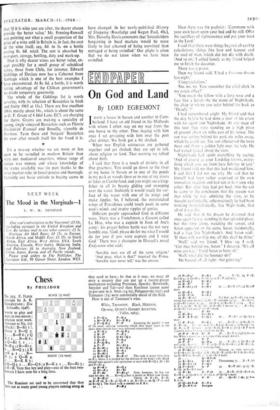ENDI?LAPER
On God and Land
By LORD EGREMONT
THAVE a house in Sussex and another in Cum- berland. I have an old friend in the Midlands with whom I often stay on my way from the one house to the other. Thus staying with him once I sat gossiping with him over the port after dinner. We both got a bit sloshed.
When two English aristocrats are gathered together and get sloshed, they are apt to talk about religion or land. That evening we talked about both.
I said that there is a touch of divinity in all the greatness. You could go down to the river at my home in Sussex or to one of the ponds in my park or woods there or to one of my rivers or lakes in Cumberland, and you might see a king- fisher in all its beauty gliding and swooping over the water. Suddenly it would touch the sur- face of the water with one of its wings and make ripples. So, I believed, the outstretched wines of Providence could touch pools in some men's minds and inspire ripples of genius.
Different people approached God in different ways. There was a Frenchman, a Gascon called La Hire, who was a captain in Joan of Arc's army : his prayer before battle was the not very humble one, 'God, please do for me what I would do for you if you were captain and I were God.' There was a character in Disraeli's novel Endyntion who said : 'Sensible men are all of the same religion.' 'And pray, what is that?' inquired the Prince. 'Sensible men never tell,' was the answer. Then there was the psalmist: 'Commune with your own heart upon your bed and be still. Offer the sacrifices of righteousness and put your trust in the Lord.'
I said that there were things beyond all earthly calculations, things like love and honour and
the soul of man, which did not die with death. 'And so on; I added lamely as my friend helped me to finish the decanter.
There was a pause.
Then my friend said, 'I had a tiresome dream last night.'
'Congratulations.'
'No, no. no. You remember the chief clerk in my estate office?'
'You mean the fellow with a long nose and a face like a ferret—by the name of Nightshade, the chap to whom you refer behind his back as "Deadly"?'
I had remembered aright. My friend said that the day before he had done a tour of his estate with his agent and Nightshade. At one stage of this tour they were standing on a high piece of ground about six miles east of his house. The
sun was setting behind his park six miles away, which he could see. The sun silhouetted the trees there and threw a golden light over the vale. He had waxed hrical about the view.
Nightshade had spoilt everything by saying, 'And of course as your Lordship knows, every- thing which ou see from here belongs to you.'
My friend told me that this had maddened him. I said that I did not see why He said that he himself had been rather surprised at his own
immediate reaction and had not at first seen why either. But after they had got back into the car
he came to the conclusion that the reason was that while he was admiring the view, as he thought aesthetically, subconsciously he had been thinking -materialistically, like Night,hade, that all of it was his.
He said that in his dream he dreamed that once again he was standing in that splendid place, but this time alone, watching the sunset, and Satan appeared on the scene. Satan. incidentally, had a face like Nightshade's. And Satan said: 'If thou wilt worship me, all this shall be thine.'
'Well,' said my friend, 'I blew up. I said, "Get thee behind me, Satan." I shouted, "It's all mine anyway.' I told Satan to buzz off.'
'Well. what did the bounder do?'
'He buzzed off all right—but grinning.'






































 Previous page
Previous page